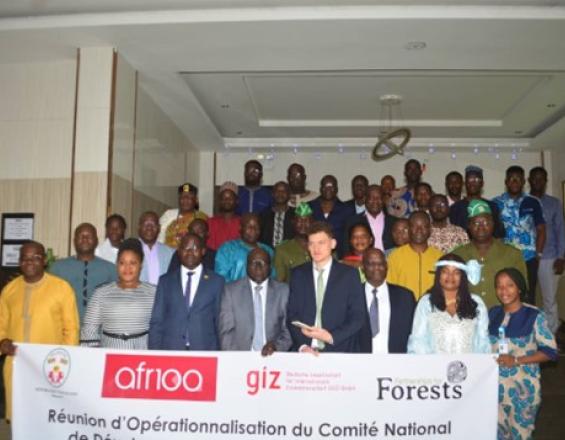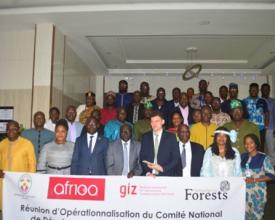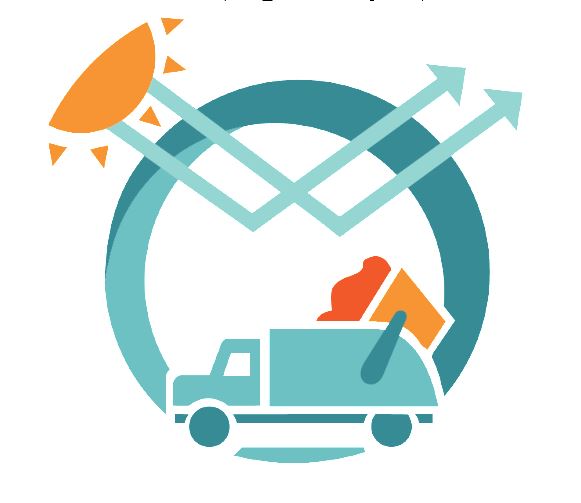
Plataformas de consulta a nivel comunal, regional y nacional para facilitar la restauración del paisaje forestal en Togo

La República de Togo es uno de los países AFR100 que ha establecido una Plataforma Nacional de Partes Interesadas AFR100 mediante la puesta en marcha de la Comisión Nacional de Desarrollo Sostenible (CNDD), una Plataforma Regional de Partes Interesadas AFR100 mediante la puesta en marcha de la Comisión Regional de Desarrollo Sostenible (CRDD) y la puesta en marcha de varias plataformas de partes interesadas AFR100 a nivel comunal mediante la puesta en marcha de la Comisión Comunal de Desarrollo Sostenible (CCDD). Sobre la base de estas plataformas, la restauración del paisaje forestal en Togo se lleva a cabo mediante una consulta intersectorial sólida y un proceso de toma de decisiones exhaustivo a varios niveles.
Contexto
Défis à relever
La degradación de los ecosistemas continúa en Togo, los ecosistemas forestales están amenazados en general. Se calcula que la cobertura forestal del país rondará el 20% en 2023/2024. Especialmente en el paisaje abierto y productivo, rico en árboles y con una fuerte influencia humana, se está produciendo un proceso de acaparamiento de tierras mediante la tala y la tala y quema de las zonas forestales restantes. La degradación del ecosistema conlleva también problemas socioeconómicos para la población local.
RETOS DEL FLR EN TOGO
- Conflictos de tenencia entre agricultores, pastores, pescadores y gestores de áreas protegidas.
- Degradación y reducción de la cubierta forestal debido a la creciente demanda de leña, madera e incendios incontrolados.
- Falta de recursos financieros para llevar a cabo actividades de restauración a muy gran escala
- Movilización de las partes interesadas para supervisar la aplicación del AFR100
- Sensibilización y refuerzo de las capacidades sobre las mejores prácticas de FLR.
- Elaboración de una estrategia nacional de FLR en Togo
- Mantenimiento y seguimiento de los plantones plantados
- Gestión del agua
Ubicación
Procesar
Resumen del proceso
El progreso de la Restauración del Paisaje Forestal (FLR) en Togo requiere un proceso de consulta a todos los niveles: ministerios implicados a nivel nacional, autoridades a nivel de la Región Central y la población a nivel local en Tchamba.
Bloques de construcción
PUESTA EN MARCHA DE LA COMISIÓN NACIONAL DE DESARROLLO SOSTENIBLE
La puesta en marcha de la Comisión Nacional de Desarrollo Sostenible de Togo en el marco de la iniciativa AFR100 se celebró en Lomé, en el Hôtel La Concorde, el 8 de febrero de 2023. Asistieron 53 participantes de organizaciones públicas, de la sociedad civil, del parlamento, líderes religiosos y tradicionales e instituciones internacionales que trabajan en Togo.
La reunión estuvo presidida por el Secretario General del Ministerio de Medio Ambiente y Recursos Forestales. Asistieron a la reunión representantes de todos los ministerios sectoriales. El discurso del Director General de AUDA-NEPAD, Dr. Nardos-Bekele Thomas, fue leído por Ousseynou Ndoye, Coordinador Regional de AFR100 para África Occidental y Central. El discurso de la GIZ-F4F fue leído por Simon Lange, de la GIZ-F4F. El Secretario General leyó el discurso del Ministro de Medio Ambiente y Recursos Forestales.
El CNDD es un decreto firmado por el Presidente de la República de Togo, el Primer Ministro y varios ministerios sectoriales de Togo. Esto demuestra un nivel muy alto de apropiación y es único en la iniciativa AFR100. Además, existen otras órdenes administrativas por las que se crean comités a nivel regional (CRDD) y comunal (CCDD). La operatividad del CNDD se ha realizado a través de los artículos 3 y 4 del decreto gubernamental de creación del CNDD.
21. LOGROS DE LOS SOCIOS EN MATERIA DE RLF EN TOGO
- Implicación política en la FLR por parte de las autoridades de alto nivel.
- Se proporcionan empleos verdes para mujeres, jóvenes, adultos y minorías a través de las actividades de FLR.
- Organización de una campaña anual de reforestación en Togo.
- Organización de una campaña nacional de lucha contra los incendios forestales y de sensibilización de la población.
- Ambición de planificar 1.000 millones de árboles para 2030, tal y como recomendó el Presidente de Togo.
- En 2022, la Unión de ONG de Togo ha plantado 826.665 árboles sobre un objetivo de 1.412.740 árboles (59 %) en 428 hectáreas sobre un objetivo de 1.423 hectáreas (30 %).
- Se han elaborado 279 planes de desarrollo empresarial (planes de negocio) para las comunidades.
- Consolidación de 30 cadenas de valor relacionadas con productos agrícolas y agroforestales.
- Evaluación de oportunidades de RPF a nivel nacional.
- En 2021, en total se produjeron 3.303.024 plantas y se restauraron 4500 hectáreas mediante el programa nacional de reforestación con financiamiento del gobierno e involucramiento de actores nacionales.
- En 2022, se produjeron un total de 5.207.250 plantas y se restauraron 8.256 hectáreas.
- Los ingresos medios aumentaron un 25 % para los hogares implicados en las cadenas de valor de la miel, la parkia biglobosa, la manteca de karité y la leña.
22. RETOS DEL FLR EN TOGO
- Problemas de tenencia y conflictos entre pequeños agricultores, pastores, pescadores y gestores de áreas protegidas.
- Degradación y reducción de la cubierta forestal debido a la creciente demanda de leña, madera e incendios incontrolados.
- Falta de recursos financieros para llevar a cabo actividades de restauración a muy gran escala
- Movilización de las partes interesadas para supervisar la aplicación del AFR100
- Sensibilización y refuerzo de las capacidades sobre las mejores prácticas de FLR
- Elaboración de una estrategia nacional de FLR en Togo
- Mantenimiento y supervisión de las plántulas plantadas
- Gestión del agua en los viveros
- Integración de la mitigación y adaptación al cambio climático y la restauración del paisaje forestal en los planes de desarrollo municipales
- Riesgos climáticos e incendios forestales
- Elevada dependencia de las comunidades de los recursos forestales
- Escasa competitividad de las ONG a la hora de movilizar fondos fiduciarios
- Predominio de la biomasa como principal fuente de energía
- Falta de materialización o respeto de los corredores de trashumancia
- Sobrepastoreo y prácticas agrícolas inadecuadas
- Urbanización incontrolada y explosión demográfica
Lección aprendida
23. RECOMENDACIONES PARA LA PUESTA EN MARCHA DE LA COMISIÓN NACIONAL DE DESARROLLO SOSTENIBLE
1. El Ministerio de Medio Ambiente y Recursos Forestales debería asumir el liderazgo en colaboración con el departamento de estadística para recopilar toda la información relevante sobre FLR a nivel nacional. Es decir, el Ministerio de Medio Ambiente servirá de repositorio de todos los datos recopilados a nivel nacional para informar al gobierno sobre el progreso hacia la consecución de la promesa de 1400000 hectáreas de bosques y tierras degradadas a la iniciativa AFR100. Esos datos recopilados a nivel nacional se transferirán después a la Secretaría de AFR100 para un repositorio centralizado que seguirán todos los países de AFR100.
2. Para atraer inversiones de inversores privados e instituciones financieras en FLR, es necesario elaborar y difundir a nivel nacional modelos de negocio beneficiosos para todas las partes.
3. Para garantizar el pleno éxito de la restauración mediante la plantación de árboles, será muy importante que el Ministerio de Medio Ambiente y Recursos Forestales pregunte cuáles son las especies preferidas por las comunidades y elabore el material de plantación que se les distribuirá. Esto aumentará las probabilidades de éxito porque las comunidades se harán cargo de todos los árboles plantados ya que serán árboles de valor ambiental, social y económico.
4. El Ministerio de Medio Ambiente y Recursos Forestales debe supervisar todas las zonas de Togo donde se hayan plantado árboles recientemente para evaluar la tasa de supervivencia y las razones del fracaso.
5. Es necesario que todos los Ministerios sectoriales designen a sus representantes en la iniciativa CNDD/AFR100.
6. El secretario permanente del CNDD/AFR100 debe seguir siendo el mismo que el secretario permanente del CNDD en su origen.
7. 7. El Ministerio de Medio Ambiente debe asumir el liderazgo de la iniciativa CNDD/AFR100.
PUESTA EN MARCHA DE LA COMISIÓN REGIONAL DE DESARROLLO SOSTENIBLE
La puesta en marcha de la Comisión Regional de Desarrollo Sostenible de la Región Central de Togo en el marco de la iniciativa AFR100 se celebró en Sokode (Togo) el 4 de mayo de 2023. Asistieron 67 participantes de organizaciones públicas y de la sociedad civil, prefectos, alcaldes, líderes religiosos y tradicionales y comunidades.
La reunión estuvo presidida por el Prefecto de Tchaoudjo. El discurso del Director General de AUDA-NEPAD, Dr. Nardos-Bekele Thomas, fue leído por Ousseynou Ndoye, Coordinador Regional de AFR100 para África Occidental y Central. El discurso de la GIZ-F4F fue leído por Simon Lange, de la GIZ-F4F. El Prefecto de Tchaoudjo pronunció el discurso de la ceremonia oficial de apertura.
32. RETOS DEL FLR EN LA REGIÓN CENTRAL DE TOGO
- Problemas de tenencia y conflictos entre pequeños agricultores, pastores, pescadores y gestores de áreas protegidas.
- Degradación y reducción de la cubierta forestal debido a la creciente demanda de leña, madera e incendios incontrolados.
- En la región central de Togo, el Ricinodendron heudelotii es una especie amenazada. Esto es interesante porque en África Central, el Ricinodendron heudelotii no es una especie amenazada.
Factores facilitadores
31. ASPECTOS DESTACADOS DE LA RFL EN LA REGIÓN CENTRAL DE TOGO
- Integración de la agricultura, la agrosilvicultura y la silvicultura, que es una buena fuente de diversificación y una posibilidad para que el Ministerio de Agricultura y Medio Ambiente colabore en cuestiones de RPF.
- Mejorar la comprensión resumiendo y compartiendo todos los proyectos gestionados por el Ministerio de Medio Ambiente y Recursos Forestales con las administraciones descentralizadas, como prefectos y alcaldes.
- La región central de Togo ofrece la oportunidad de restaurar más de 1.400.000 hectáreas de bosques y tierras degradados, lo que supera el compromiso del gobierno con la iniciativa AFR100. Esto implica que Togo tiene la posibilidad de comprometer más de 1.400.000 hectáreas si se considera todo el país.
Lección aprendida
33. RECOMENDACIONES PARA LA PUESTA EN MARCHA DE LA COMISIÓN REGIONAL DE DESARROLLO SOSTENIBLE
1. Introducir árboles de crecimiento rápido para que las comunidades tengan más acceso a fuentes de leña y carbón vegetal
2. Subvencionar el coste del gas (para la cocción doméstica) para hacerlo más accesible a las comunidades rurales con el fin de reducir la presión sobre los bosques. Esto debería ser posible, ya que en Togo el precio de un litro de combustible es de 700 francos CFA mientras que en Senegal es de 990 francos CFA
3. Aprovechar al máximo la situación demográfica para implicar a los jóvenes en las actividades de restauración en Togo
4. Las estufas mejoradas puestas en marcha por la ONG AGAIB deben ser ampliamente difundidas y ampliadas para reducir el uso de leña y carbón vegetal
5. Permitir a las comunidades acceder a más agua potable y mejorar su salud
6. La restauración de los bosques comunitarios y comunales debe incluir siempre productos forestales no madereros como el karité(Vitelaria paradoxa) y el néré(Parkia biglobosa), que son especies muy valiosas para las comunidades.
PUESTA EN MARCHA DE LAS COMISIONES COMUNALES DE DESARROLLO SOSTENIBLE (CCDD)
En el marco de una gestión medioambiental integradora, Togo creó las Comisiones Comunales para el Desarrollo Sostenible (CCDD), que son plataformas de consulta descentralizadas para mejorar la participación de las comunidades en los debates medioambientales. Estas comisiones también se ocupan de cuestiones relacionadas con la FLR. F4F-Togo apoyó la creación de CCDD en tres comunas de la prefectura de Tchamba con el fin de mejorar la capacidad operativa para llevar a cabo medidas de FLR. Un CCDD es una plataforma multisectorial compuesta por el alcalde, jefes de cantón, presidentes de comités de aldea, jefes de servicios descentralizados, grupos de mujeres y ONG. Actúa como comité de gestión de los aspectos medioambientales, en general, y de la FLR, en particular. Los miembros de estas comisiones son personas de referencia para el asesoramiento y la capacitación, lo que permite a las comisiones evaluar los problemas medioambientales, proponer soluciones y movilizar recursos.
Factores facilitadores
- Gran interés de la población local
- Compromiso de las autoridades locales
- Apoyo financiero y técnico de GIZ-Forests4Future
Lección aprendida
Impactos
- Garantizar la legitimidad y adaptabilidad de las opciones de restauración mediante la participación de los CCDD
- Aplicación de las disposiciones legales para garantizar el cumplimiento de los compromisos de Togo con el Desafío de Bonn y la Convención Marco de las Naciones Unidas sobre el Cambio Climático (CMNUCC).
- Garantía de la inclusividad de las medidas de FLR que se propongan en los planes de desarrollo municipal de la prefectura
- Apoyo a las medidas de gestión sostenible de los bosques comunales y restauración de los paisajes agroforestales mediante material de plantación producido por obtentores comunales
Impactos
Impactos
- Garantizar la legitimidad y adaptabilidad de las opciones de restauración mediante la participación de los CCDD/CRDD/CNDD
- Aplicación de las disposiciones legales para garantizar el cumplimiento de los compromisos de Togo con el Desafío de Bonn y la Convención Marco de las Naciones Unidas sobre el Cambio Climático (CMNUCC).
- Garantía de la inclusividad de las medidas de FLR que se propongan en los planes de desarrollo municipal de la prefectura
- Apoyo a las medidas de gestión sostenible de los bosques comunales y restauración de los paisajes agroforestales mediante material de plantación producido por obtentores comunales
Beneficiarios
- Población local y comunidades de la comunidad Tchamba/Prefectura Tchamba/Región Central de Togo.
- Ministerios en Lomé
- Autoridades locales y regionales del MERF y del Dpto. de Bosques.




